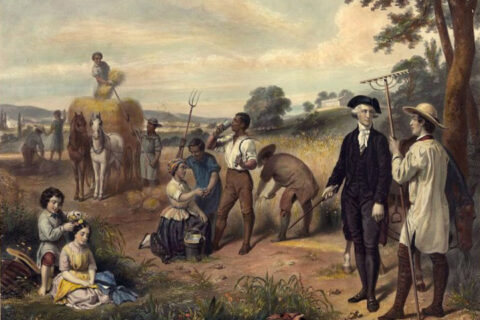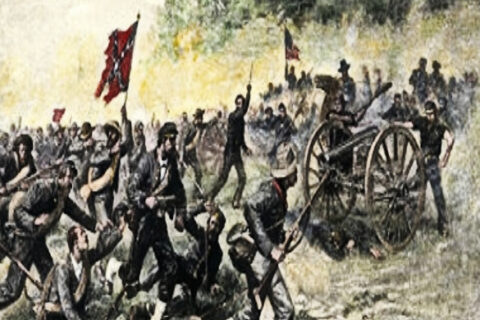The ruins of factories and military warehouses still smoldering, the victorious conqueror rides into his vanquished foe’s capitol flanked by a cohort of helots turned soldiers. A gathering of these self-same members of a servile class gather to greet their would-be liberators and proclaim their gaunt faced and bewhiskered new messiah.
Such was the scene that greeted Abraham Lincoln as he entered Richmond after the evacuation of the Confederate capitol. While the war still continued to rage on for another month beyond this point; both the conqueror and the Confederacy were in their final days. And, it marked the ruination of the Confederacy and her predecessor, the Old American Republic. In turn, a more ghastly monstrosity, far worse than the scene of murdered Richmond, was born through the blood of grey and blue ghosts – the American Empire.
Yet, in this crowning moment of achievement as “they drove old Dixie down,” a new age was born. The era of agrarianism was over, industry and commerce would reign supreme in reshaping the South and the nation at large. Reconstruction and the “Gilded Age” that followed represented the destruction of the old antebellum social and political order. The old brahmin elites of New England would turn self-reflective towards what had been sacrificed or loose themselves in the passions of the latest social justice fad: from suffrage to “civilizing” the natives and eventually prohibition.
The agrarian traditions of the South were meant to be completely upended and forcefully overthrown for the sake of a former servile class. Erstwhile enemies, while now nominally “countrymen” again, were to be stripped of their social order and impoverished to an extent that took nearly a hundred years to achieve some semblance of recovery. Those brave cavaliers were defeated in the field, but they won a proud honor foreign to the Yankee nation.
Meanwhile, the victorious social engineers threw open the floodgates of immigration to “the wretched refuse of Europe” and further diluted their own native stock. These new comers added their own culture and radical political ideologies to the cauldron that had become the great cities of America. The former Confederacy had been defeated and ruled by the Empire, but her people endured.
The “Captains of Industry,” who led the nation into the late 19th and early 20th century, owed their place to the destruction of 1865.
-By Anon

O I’m a good old rebel, now that’s just what I am. For this “fair land of freedom” I do not care at all. I’m glad I fit against it, I only wish we’d won, And I don’t want no pardon for anything I done.





As you might know, I often cite Dr. Robert Lewis Dabney in these threads. I do so for a combination of reasons: first, because Dabney is almost always spot-on in these relations; second, because I am really just a nobody whose opinions and learned experiences are essentially meaningless to the average modern reader, whereas Dabney’s place and influence in Southern History is well established, even among those who might be reading his wise and prophetic counsels for the first time.
Anyway, I wrote an article on this subject a year or so ago for my kith and kin at their/our private family blog. Below is the article in full, in which Dabney of course occupies a prominent place.:
The Superiority of the pre-Civil War Southern System
I have, as you all know, quoted R. L. Dabney numerous times before in this relation. Dabney wrote prolifically on the subject of the South’s superior system in various veins including its (vastly) superior economy, which he proves conclusively via northern sources. In this connection Dabney wrote a book entitled Defense of Virginia and the South, within which pages one may find this interesting relation:
(brackets mine)
This sort of Yankee “reasoning” Dabney exposes in that final sentence is pervasive in our society. As it well should be, one supposes, given that the Yankee system – with all its unproductive middle-men – was imposed upon the nation following the so called Civil War.
I have actually talked about that before many times in relation to various current events. Most recently of course with respect to the whole teacher pay issue. We’re all poorer for the $6,100. raise Oklahoma teachers recently received, including the teachers themselves, over the long haul. Meanwhile they go about congratulating themselves for their mischievous prosperity, to borrow again from Dr. Dabney.
But I have also run into this very attitude with respect to other so called “private” industry. A few years ago a Tulsa resident and “private” business owner wrote an Opinion Piece that was published in the Tulsa World newspaper. In the piece, the scribbler wrote that he is ‘always amused by conservatives who decry wasteful government spending.’ He held himself and his business up as the model of how government spending actually “boosts” the economy rather than flattening and ultimately destroying it. He bragged that within a span of only three years his business had grown from three full time employees, to over ninety full time employees. He revealed that over 98% of the funding for his business came directly from Medicaid.
His (purely idiotic) thinking on the matter was that, since all of those employees were spending their earnings in the marketplace (purchasing and insuring better cars and bigger houses, purchasing food stuffs and various luxury items, and so on) that this fact meant that the economy is actually helped rather than harmed by their unproductive participation. (By “unproductive participation” I mean to say that these people are not creating wealth, but consuming it.)
Now, the problem with this sort of “reasoning” is several-fold. Firstly, transferring wealth from the productive to the unproductive classes is simply transferring wealth, it is in no way adding to, nor taking away from, the general output and accumulation of the wealth producing classes. Dabney is perfectly right to point this out by citing a preposterous example. The idea that criminality helps the economy by opening up a new industry (that of law enforcement and the penal system) is preposterous on its face! The police and penal systems are a complete loss because they do not and cannot produce wealth, they can only consume it. We’re all worse off, not better off, for the criminal elements amongst us. Most people understand this basic principle, but they nevertheless have a hard time applying it elsewhere.
Likewise, the writer of the piece alluded to makes the same fundamental error of reasoning that the transfer of wealth to unproductive consumers of same can in any way make an economy better or more stable. According to his reasoning, that he and his employees provide the service of “counseling” to “troubled teens” and their dysfunctional families, this means that government spending on programs like Medicaid are not only justifiable, but in fact a vital part of the economic system and its long term stability. But as I pointed out in a letter to the editor in reply to this man’s palpable error, ‘what you are essentially saying, sir, is that the more dysfunctional families become the better off the economy will be since, of course, the more dysfunctional families you can find to “counsel” the more employees you will need to hire to meet that demand; and the more employees you hire to meet that demand, the more they will, in turn, spend on all the necessities (and non-necessities) of life, thus “boosting” the economy in your silly estimation.’
Again, I cannot stress enough how ludicrous this type of thinking is. Such people are a huge drain and a bane on society, and should not be let within a country-mile of a voting booth!
End of article.